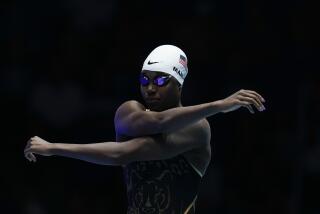San Marino teen prepares to paddle off to college
Under dark clouds, cool temperatures and occasional rain, more than a dozen teenage girls dressed in T-shirts and shorts are paddling up and down the back channels of Alamitos Bay in Long Beach.
Most come from high schools where water is close by -- Long Beach Poly, Los Alamitos, Long Beach Wilson. Then there’s the 18-year-old who drives a hybrid, Rebeca Felix. She makes a one-hour trip six days a week from landlocked San Marino.
“By the time I get there, my brain is recharged and I’m ready to row,” Felix said.
All the girls are pursuing what their coach, Alfredo Montenegro, says is “the best-kept secret in America”: a college rowing scholarship.
“If you’re a good rower, you can qualify for any university you wish if you’re a good student, too,” he said.
With almost 150 NCAA schools competing in women’s rowing thanks to Title IX requirements, the demand for high school rowers is robust. Eleven girls from last year’s Long Beach Junior Crew team made it to college rowing programs, according to Montenegro. Others have moved on after rowing at Marina del Rey, Newport Beach and Lake Casitas.
On Wednesday, when high school seniors can sign letters of intent for all sports except football, water polo, soccer and track and field, Felix will sign with NCAA rowing champion Stanford.
“It’s just unbelievable so many people would be interested,” she said.
Felix is considered one of the top recruits in the nation, having won a gold medal in the eights last August in France at the World Rowing Junior Championships.
She and her fellow U.S. team members kept imagining what it would be like to take on the Germans, Romanians and French.
“When we finally got there and saw them, it wasn’t as difficult to picture beating them,” she said. “Winning is the high point of my life so far.”
Her older sister, Cristina, won the same gold medal last year and is a scholarship rower at Michigan.
The Felix sisters got their introduction to rowing from their father, Juan Carlos Felix, who competed in the 1984 and 1988 Olympic Games in the single sculls for Puerto Rico.
“We knew there was a boathouse opening up in Long Beach,” Rebeca Felix said. “He started looking into it and thought it was something fun he could teach me to do.”
With a 4.1 grade-point average and a passion for rowing, Felix has found a niche despite heavy demands.
“It’s definitely a challenge,” she said. “There’s only so much time I have left for homework when I get back from practice. My family helps me maintain balance. A lot of it is time management and commitment.”
Paddling on the water is both refreshing and painful, she said. Almost every muscle seemingly comes into use. And no matter how strong or successful an individual might be, it’s how the rowers perform together as a group that propels the boat.
“You can be the strongest person in the world, but if you can’t row in unison with everyone, the boat isn’t going to move as well,” Felix said. “It’s everything about teamwork and team support. You make the best friends because everyone is in the same position as you.”
The most common shared feeling is pain, which is why the finish line offers both ecstasy and agony.
“The finish line is kind of relief, and it’s also bad because you realize how everything hurts when you stop,” Felix said.
Of course, finishing first helps, as does knowing your stroke is working to perfection.
“It’s just so rewarding once you finally master it,” Felix said. “Once you get the feeling you’re doing it right and start going faster and faster, it’s so much fun, and I fell in love with it.”
And with rowing helping to pay for her college education, Felix couldn’t be happier.
--
twitter.comLATsondheimer
More to Read
Get our high school sports newsletter
Prep Rally is devoted to the SoCal high school sports experience, bringing you scores, stories and a behind-the-scenes look at what makes prep sports so popular.
You may occasionally receive promotional content from the Los Angeles Times.







